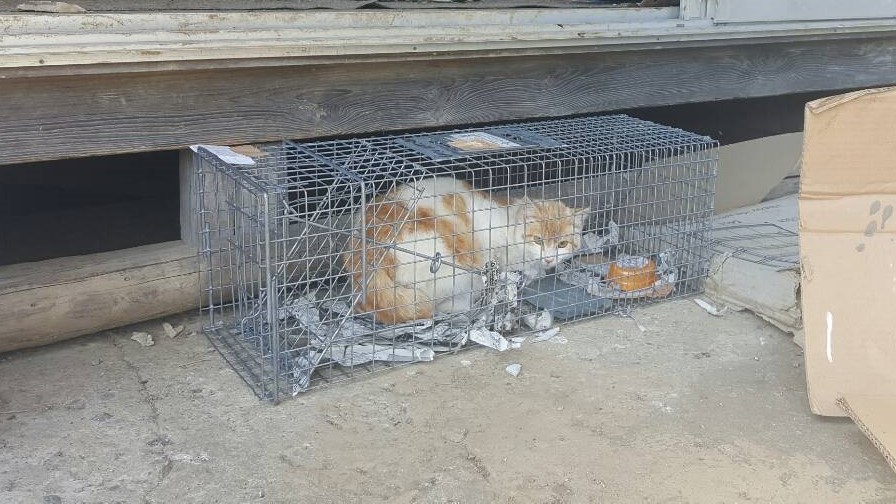

Activity Report (May-August 2016, Fukushima) We spent time in Futaba and Okuma, rescuing cats with local residents Back in April, we were able to rescue two cats in the no-entry zone. They were sisters. This is now a dust-covered ghost town, and the residential area is now piled high with black garbage bags containing contaminated soil. The government has purchased the homes (so far about 30%) along the coastline in Futaba, Okuma and Tomioka, and is using the land as a place to store the bags of irradiated soil. The properties are now marked as being under the administration of Japan’s Ministry of the Environment. Futaba is home to many old buildings, and many have been left in the same condition as they were in after the disaster. Our surveillance cameras tell us that there are cats in the area, but so far we have been unable to rescue them, so we leave food for them. We have learned that a new village will be created in the Ogawara district of Okuma for nuclear plant workers and elderly citizens of the area. Even the roads inside the no-entry zone are now open to traffic in order to bring in necessary supplies. A security gate blocks off the road that leads to the homes in this area. We noticed a cat in this abandoned convenience store and attempted rescue but were unsuccessful. The five-hour time window doesn’t give us nearly enough time to rescue cats. Over in Namie, Tsushima and Nagadoro (located in Iitatemura) radioactive contamination is a serious problem. While the old days of carefree living in nature are gone forever, we are starting to see signs of life and recovery when we return to our old homes for a visit. People want to come back here and spend a little time. One family went to the trouble of creating a watering area, even though they come only occasionally. This allows us to clean our cat feeding stations. Some return home during the summer memorial holiday to pay respects at the family grave. A local ward mayor continued his dairy farming even after being moved to the evacuation zone; he hasn’t missed a day of work. The animals are undoubtedly grateful, and we were moved by his strength and kindness despite all he has been through. These beautiful montain villages have been irrevocably changed, but the hearts of those who lived here and love this place remain. English by Judy Howland
双葉町帰還困難地区で、痩せて、ベリーベリー

同じ場所の姉妹 キャラメルリボンちゃん

双葉町は地震後のまま

双葉町

双葉町の住宅地

双葉町

放射性廃棄物の袋が住宅地に

無人の町

監視カメラのセット

国に買いあげられて 玄関のドアに札が、、F町海沿い

海の見える家です

失われた生活

コンビニで猫を見ました
猫の保護を、、
家の方が猫を探す手伝いをします
あまり水場がありません

大熊町大川原

大熊町では数十人の老人が帰還するための町を作ります


原発作業員のマンションが出来ました 大熊町大川原

立ち入り禁止区域を国道が通ります

全ての家に行く道にゲートがあります

1軒のためのゲート

大熊町帰還困難地区を国道が通ります

常磐自動車道から荒れた農地を見て

除染土の入る袋置き場

浪江ICから浪江町の帰還困難地域へ 常磐自動車

浪江町津島は標高の高い山里


何百年も続く山里(阿武隈山地)

一時帰宅で庭を手入れ、、

水場や道を直してくださいます

沢水を引いた水場

お墓参りで一時帰宅

賑やかでした

津島のシャミーは捕まらなくて、、

築250年以上

区長さんのお一人旧農家 は福島市で働いています 猫もよそ者も助けてくださいます

花が路を護っているようです




































